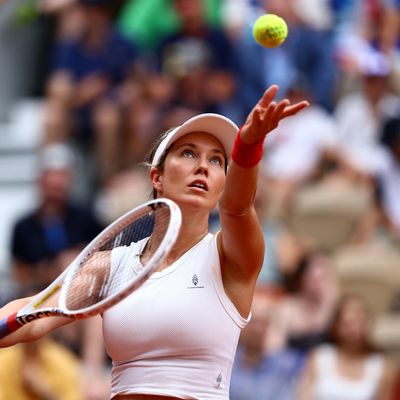
The long arc of a professional tennis player’s career does not ordinarily conclude like a fairy tale. If other athletes, particularly those in team sports, might find a way to cheat time — take LeBron James — the tennis player more often tries to defy it, toiling through their twilight years on the circuit in a body that doesn’t quite work the way it once did. Even Roger Federer, you might recall, was bageled in his last-ever Grand Slam match, while Serena Williams showed only flashes of stubborn greatness on her way to a third-round exit in her final major, the 2022 U.S. Open.
The tenacious American player Danielle Collins, however, is writing a different ending for herself. The world No. 10, who announced at the Australian Open in January that this season would be her last on tour, is enjoying an unusually prosperous farewell at the mildly advanced age of 30. On Tuesday, Collins begins her U.S. Open campaign in Flushing Meadows, where she’s never made it past the Round of 16. But then again, Collins — whom fans and peers alike affectionately refer to as “Danimal” for both her ruthless, power-baseline game and her plucky, take-no-prisoners temperament on court — has never had a year quite like this.
In the spring, while ranked No. 53 in the world, Collins summoned the best tennis of her career to win the prestigious Miami Open, a tournament the St. Petersburg, Florida, native, born to a teacher and a landscaper, had aspired to play since she was a young girl.
“My dad said to me when I was a kid, ‘You’re only going if you play in the tournament,’” Collins said in an on-court interview after winning her semifinal match. “So you have to make the tournament.” Unlike many of her more well-to-do compatriots on the circuit, like the billionaire scions Jessica Pegula and Emma Navarro, Collins grew up without the material resources typically required to succeed in a costly and culturally upper-crust sport. Perhaps more unusual, though, is that Collins played college tennis, winning two NCAA singles titles at the University of Virginia before officially turning pro in 2016. That counts as a rather unconventional trajectory in a sport where prodigies are often being sent off to tennis academies in Monaco or Boca Raton before they hit puberty.
Refreshingly, Collins also eschews much of the dry politicking common among her peers, favoring blunt and at times disagreeable bursts of competitive spirit. At the Olympics last month, for instance, after retiring from her match against world No. 1 Iga Swiatek with an injury, Collins brushed off the Pole’s requisite display of sympathy when the pair shook hands. “I told Iga she didn’t have to be insincere about my injury,” Collins would later explain. “I can accept that, and I don’t need the fakeness.” More recently, at a U.S. Open tune-up event in Mexico, Collins gave an unruly group of fans in the stands a lesson in tennis decorum. “What in the world?” she hollered in their direction. “I don’t get it. It’s not that hard to let us play tennis and, like, be supportive.”
Off the court, Collins has demonstrated a similar candor when asked to explain the logic of her upcoming retirement, which might seem premature when taking into account her 2024 results: two titles, in Miami and Charleston, three wins over top-ten players, and a 39–13 win-loss record. But longtime struggles with rheumatoid arthritis and endometriosis — in 2021, Collins had a “cyst the size of a tennis ball” removed from her ovaries — have prompted her to consider what life might look like after tennis. “Being a mom is one of my biggest dreams outside of the court,” she told Good Morning America in April. “When people ask about retirement, I’m like, this is not something that I can really wait much longer.”
In any case, the 2024 season has been its own strange fairy tale, the kind of triumphant — and dignified — last gasp few tennis players (with a couple of notable exceptions) have enjoyed. And how many of them can boast of a shout-out from Matthew McConaughey? “Danielle Collins is one of the secretly great sport/life stories of 2024,” the actor tweeted in July. “Major proof of ‘1st time’s the last’ mental state.” Now, in her last chance to win a major, Collins arrives at her home slam with the crowd in her corner and as good a chance as anyone at making a deep run.
More From This Series
- The 7 Most Important Athletes of 2024
- Why Does the New Aaron Rodgers Documentary Exist?
- 7 Takeaways From the Mets’ Blockbuster Juan Soto Signing





























